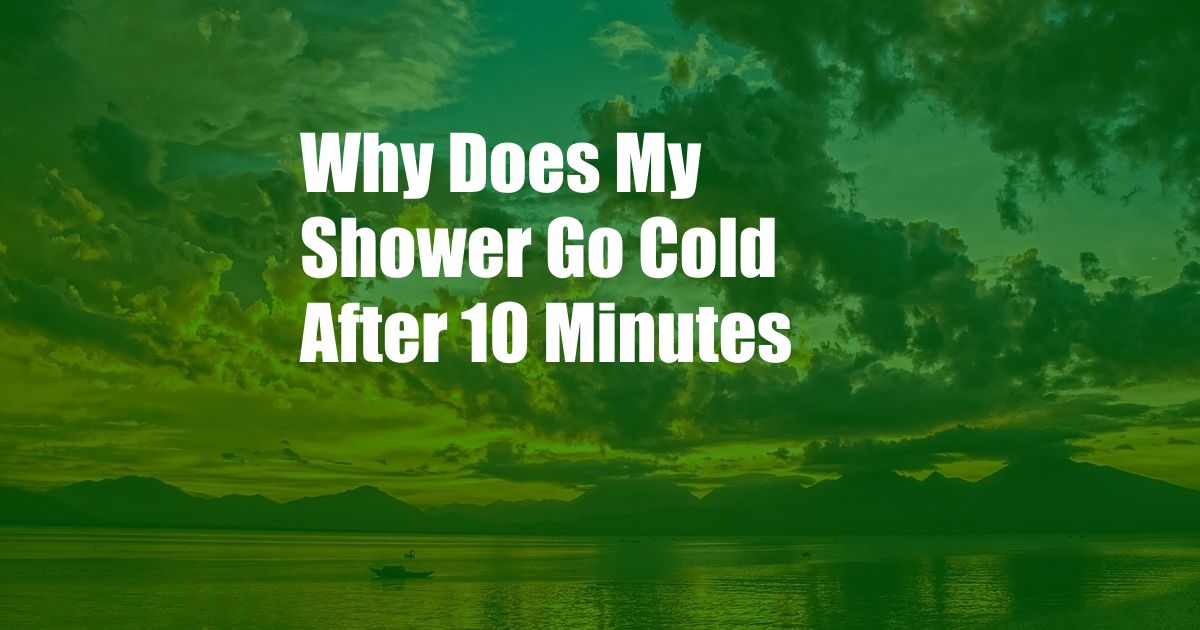
Why Does My Shower Go Cold After 10 Minutes?
Say goodbye to mid-shower shivers! Ever experienced a freezing chill mid-shower, only to question why your once-warm water has suddenly turned icy? If yes, join the club. This common issue plagues countless households, leaving us yearning for a comfortable shower experience. But fear not, as we delve into the depths of this mystery, uncovering the potential culprits and unveiling practical solutions.
Water Heater Capacity and Demand
When your shower goes cold after 10 minutes, it often boils down to an imbalance between your water heater’s capacity and the demand for hot water in your home. Simply put, if your water heater is too small or the demand for hot water is too great, the water heater cannot keep up, resulting in a sudden drop in temperature.
Water Heater Capacity:
The size of your water heater is measured in gallons and indicates its ability to store and heat water. If your water heater is too small for your household’s consumption, it may run out of hot water during peak usage, such as when showering.
Demand for Hot Water:
The demand for hot water is determined by factors like the number of showers taken simultaneously and the efficiency of your showerheads. If multiple hot water appliances, such as washing machines and dishwashers, are running concurrently with your shower, it can further deplete the supply of hot water.
Fixing the Imbalance
Increase the Water Heater Capacity:
If your water heater is undersized, consider upgrading to a larger model with a higher gallon capacity. This ensures that there is an adequate reserve of hot water to meet your household’s demand.
Reduce the Demand for Hot Water:
Lowering the demand for hot water can also help alleviate the problem. Install low-flow showerheads and faucets to conserve water and reduce the strain on your water heater. Stagger showers to avoid multiple concurrent uses and limit the use of hot water-consuming appliances during peak hours.
Troubleshooting Other Causes
Beyond capacity and demand, other factors can contribute to cold showers.
Sediment Build-Up:
Sediment accumulates over time in water heaters, reducing their efficiency and limiting the amount of hot water they can produce. If your shower goes cold after 10 minutes and you notice an odd smell or discoloration in the water, sediment build-up may be the culprit. Flush your water heater regularly to remove sediment and maintain its performance.
Malfunctioning Heating Elements:
Heating elements in water heaters are responsible for warming the water. If a heating element fails or malfunctions, it can impact the water temperature. Call a qualified plumber to inspect and replace faulty heating elements.
Thermostat Issues:
The thermostat regulates the temperature of the water in your heater. A malfunctioning thermostat can lead to incorrect water temperatures, resulting in cold showers. Consider replacing the thermostat if you suspect it’s causing problems.
Expert Advice
Install a Timer:
A shower timer can limit your shower duration, reducing hot water consumption and preventing sudden temperature drops.
Insulate the Water Heater:
Insulating your water heater helps retain heat, reducing energy loss and improving efficiency.
Consider a Tankless Water Heater:
Tankless water heaters provide an endless supply of hot water on demand, eliminating concerns about running out of hot water during showers.
Seek Professional Help:
If you have tried the above solutions but still encounter cold showers, don’t hesitate to call a licensed plumber for further troubleshooting and repairs.
FAQ
Q: Can low water pressure affect shower temperature?
A: Yes, low water pressure can restrict the flow of hot water to your showerhead, resulting in a weaker stream and lower temperature.
Q: Why does my shower get cold after using the kitchen sink?
A: Running cold water from the kitchen sink can mix with the hot water in your shower line, resulting in a sudden temperature drop.
Q: Is it safe to flush a water heater myself?
A: Yes, it is generally safe to flush a water heater yourself. Follow the manufacturer’s instructions carefully and ensure the water heater is turned off and cooled before draining.
Conclusion
Understanding the reasons behind your shower going cold after 10 minutes empowers you to find effective solutions. By addressing water heater capacity, demand for hot water, and other potential issues, you can restore the comfort of warm showers. While DIY solutions can often resolve the problem, don’t hesitate to seek professional help if necessary. Are you interested in knowing more about the topic of why showers go cold after 10 minutes? If so, please let us know in the comments section below.